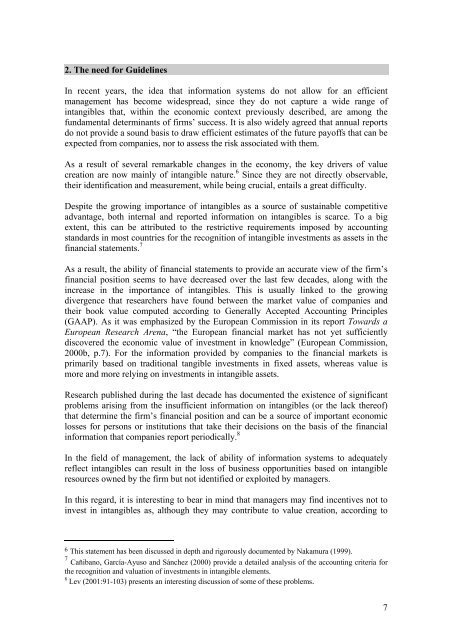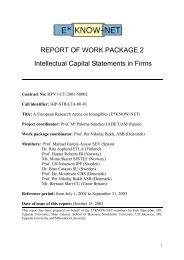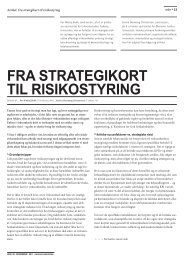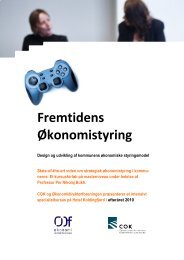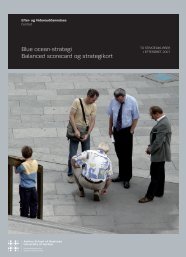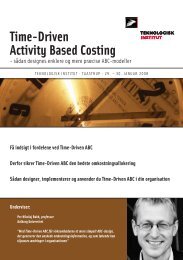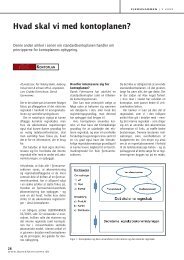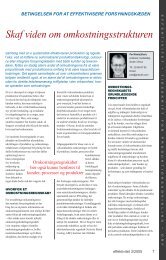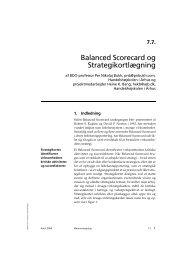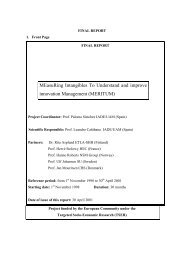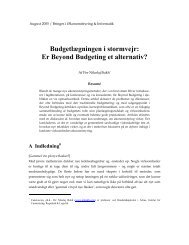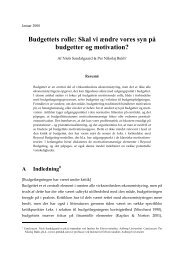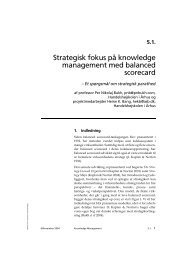guidelines for managing and reporting on intangibles (intellectual
guidelines for managing and reporting on intangibles (intellectual
guidelines for managing and reporting on intangibles (intellectual
You also want an ePaper? Increase the reach of your titles
YUMPU automatically turns print PDFs into web optimized ePapers that Google loves.
2. The need <str<strong>on</strong>g>for</str<strong>on</strong>g> Guidelines<br />
In recent years, the idea that in<str<strong>on</strong>g>for</str<strong>on</strong>g>mati<strong>on</strong> systems do not allow <str<strong>on</strong>g>for</str<strong>on</strong>g> an efficient<br />
management has become widespread, since they do not capture a wide range of<br />
<strong>intangibles</strong> that, within the ec<strong>on</strong>omic c<strong>on</strong>text previously described, are am<strong>on</strong>g the<br />
fundamental determinants of firms’ success. It is also widely agreed that annual reports<br />
do not provide a sound basis to draw efficient estimates of the future payoffs that can be<br />
expected from companies, nor to assess the risk associated with them.<br />
As a result of several remarkable changes in the ec<strong>on</strong>omy, the key drivers of value<br />
creati<strong>on</strong> are now mainly of intangible nature. 6 Since they are not directly observable,<br />
their identificati<strong>on</strong> <str<strong>on</strong>g>and</str<strong>on</strong>g> measurement, while being crucial, entails a great difficulty.<br />
Despite the growing importance of <strong>intangibles</strong> as a source of sustainable competitive<br />
advantage, both internal <str<strong>on</strong>g>and</str<strong>on</strong>g> reported in<str<strong>on</strong>g>for</str<strong>on</strong>g>mati<strong>on</strong> <strong>on</strong> <strong>intangibles</strong> is scarce. To a big<br />
extent, this can be attributed to the restrictive requirements imposed by accounting<br />
st<str<strong>on</strong>g>and</str<strong>on</strong>g>ards in most countries <str<strong>on</strong>g>for</str<strong>on</strong>g> the recogniti<strong>on</strong> of intangible investments as assets in the<br />
financial statements. 7<br />
As a result, the ability of financial statements to provide an accurate view of the firm’s<br />
financial positi<strong>on</strong> seems to have decreased over the last few decades, al<strong>on</strong>g with the<br />
increase in the importance of <strong>intangibles</strong>. This is usually linked to the growing<br />
divergence that researchers have found between the market value of companies <str<strong>on</strong>g>and</str<strong>on</strong>g><br />
their book value computed according to Generally Accepted Accounting Principles<br />
(GAAP). As it was emphasized by the European Commissi<strong>on</strong> in its report Towards a<br />
European Research Arena, “the European financial market has not yet sufficiently<br />
discovered the ec<strong>on</strong>omic value of investment in knowledge” (European Commissi<strong>on</strong>,<br />
2000b, p.7). For the in<str<strong>on</strong>g>for</str<strong>on</strong>g>mati<strong>on</strong> provided by companies to the financial markets is<br />
primarily based <strong>on</strong> traditi<strong>on</strong>al tangible investments in fixed assets, whereas value is<br />
more <str<strong>on</strong>g>and</str<strong>on</strong>g> more relying <strong>on</strong> investments in intangible assets.<br />
Research published during the last decade has documented the existence of significant<br />
problems arising from the insufficient in<str<strong>on</strong>g>for</str<strong>on</strong>g>mati<strong>on</strong> <strong>on</strong> <strong>intangibles</strong> (or the lack thereof)<br />
that determine the firm’s financial positi<strong>on</strong> <str<strong>on</strong>g>and</str<strong>on</strong>g> can be a source of important ec<strong>on</strong>omic<br />
losses <str<strong>on</strong>g>for</str<strong>on</strong>g> pers<strong>on</strong>s or instituti<strong>on</strong>s that take their decisi<strong>on</strong>s <strong>on</strong> the basis of the financial<br />
in<str<strong>on</strong>g>for</str<strong>on</strong>g>mati<strong>on</strong> that companies report periodically. 8<br />
In the field of management, the lack of ability of in<str<strong>on</strong>g>for</str<strong>on</strong>g>mati<strong>on</strong> systems to adequately<br />
reflect <strong>intangibles</strong> can result in the loss of business opportunities based <strong>on</strong> intangible<br />
resources owned by the firm but not identified or exploited by managers.<br />
In this regard, it is interesting to bear in mind that managers may find incentives not to<br />
invest in <strong>intangibles</strong> as, although they may c<strong>on</strong>tribute to value creati<strong>on</strong>, according to<br />
6 This statement has been discussed in depth <str<strong>on</strong>g>and</str<strong>on</strong>g> rigorously documented by Nakamura (1999).<br />
7 Cañibano, García-Ayuso <str<strong>on</strong>g>and</str<strong>on</strong>g> Sánchez (2000) provide a detailed analysis of the accounting criteria <str<strong>on</strong>g>for</str<strong>on</strong>g><br />
the recogniti<strong>on</strong> <str<strong>on</strong>g>and</str<strong>on</strong>g> valuati<strong>on</strong> of investments in intangible elements.<br />
8 Lev (2001:91-103) presents an interesting discussi<strong>on</strong> of some of these problems.<br />
7


